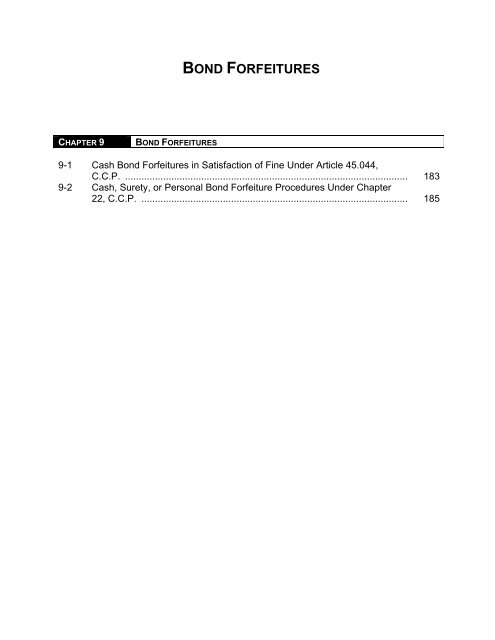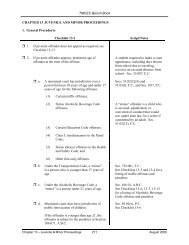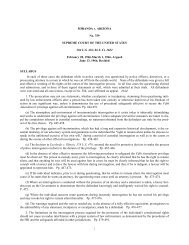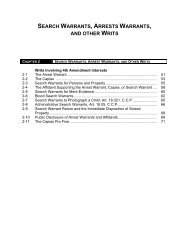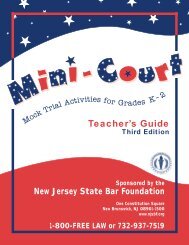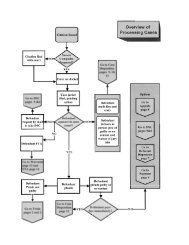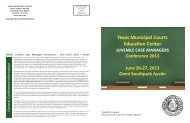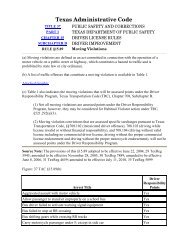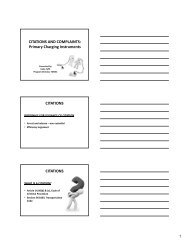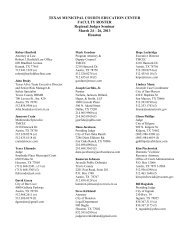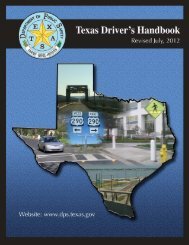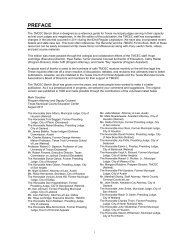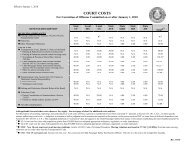ix.bond forfeitures - Texas Municipal Courts Education Center
ix.bond forfeitures - Texas Municipal Courts Education Center
ix.bond forfeitures - Texas Municipal Courts Education Center
Create successful ePaper yourself
Turn your PDF publications into a flip-book with our unique Google optimized e-Paper software.
BOND FORFEITURES<br />
CHAPTER 9<br />
BOND FORFEITURES<br />
9-1 Cash Bond Forfeitures in Satisfaction of Fine Under Article 45.044,<br />
C.C.P. ........................................................................................................ 183<br />
9-2 Cash, Surety, or Personal Bond Forfeiture Procedures Under Chapter<br />
22, C.C.P. .................................................................................................. 185
TMCEC Bench Book<br />
CHAPTER 9 BOND FORFEITURES<br />
<strong>Municipal</strong> judges are empowered to admit persons to bail and to forfeit bail in the same manner as<br />
provided for county courts. The failure to perform the condition on the <strong>bond</strong> causes the court to declare<br />
forfeiture of the bail. Therefore, a defendant’s failure to appear in court after posting bail and the judicial<br />
declaration of the forfeiture initiates <strong>bond</strong> forfeiture procedures.<br />
Generally, Chapter 22, C.C.P., governs <strong>bond</strong> forfeiture proceedings. The exception to using the <strong>bond</strong><br />
forfeiture procedures in Chapter 22 is found in Article 45.044, C.C.P. This statute provides an additional<br />
method of forfeiting a cash <strong>bond</strong> in certain instances.<br />
1. Cash Bond Forfeitures in Satisfaction of Fine Under Article 45.044, C.C.P.<br />
Checklist 9-1<br />
Script/Notes<br />
1. Ask the defendant to acknowledge his or her presence<br />
when the defendant’s name is called.<br />
2. When the defendant fails to answer, order the bailiff<br />
or another to call the defendant’s name distinctly at<br />
the courthouse door.<br />
3. If the defendant has posted a cash <strong>bond</strong> and has signed<br />
a conditional plea of nolo contendere and waiver of<br />
jury trial, the judge may forfeit the <strong>bond</strong> for fine and<br />
court costs when the defendant fails to appear.<br />
Otherwise, skip remaining steps and proceed to<br />
judgment.<br />
Art. 22.02, C.C.P.<br />
Calling name in hallway on s<strong>ix</strong>th<br />
floor is sufficient. Burns v. State,<br />
814 S.W.2d 768 (Tex. App.—<br />
Houston [14th Dist.] 1991, rev’d<br />
on other grounds).<br />
See TMCEC Forms Book:<br />
Bailiff/Clerk’s Affidavit of<br />
Defendant’s Failure to Appear.<br />
Art. 45.044, C.C.P.<br />
4. Notify the defendant immediately by regular mail of<br />
the court action and the right to request a new trial.<br />
5. If the defendant makes a request for a new trial within<br />
10 days after the forfeiture, the court shall grant the<br />
motion and allow the defendant to withdraw his or her<br />
conditional plea of nolo contendere and waiver of jury<br />
trial. The <strong>bond</strong> is reinstated and the case is set for trial.<br />
Sec. 311.014, G.C.<br />
To count, start the day after the forfeiture and count<br />
10 calendar days. If the 10 th day falls on a weekend or<br />
holiday, go to the next working day of the court for<br />
the 10 th day.<br />
a. Amount of time increased by the “Mailbox<br />
Rule.”<br />
If the request for new trial is mailed first class<br />
Art. 45.013, C.C.P.<br />
Defendants filing documents by<br />
mail have additional time (10 days)<br />
in which to present the document<br />
Chapter 9 - Bond Forfeitures 183 August 2011
TMCEC Bench Book<br />
mail on or before the due date of filing of the<br />
request for new trial and received by the clerk<br />
not later than 10 days after the due date, the<br />
motion is properly filed. (“Day” does not<br />
include Saturday, Sunday, or legal holiday.)<br />
Make sure the clerk keeps the envelope<br />
showing the postmark.<br />
to the court. This rule, commonly<br />
called the “Mail Box Rule,”<br />
increases the time for filing<br />
documents.<br />
6. If the defendant does not make a timely motion for a<br />
new trial, the judgment and forfeiture becomes final.<br />
Court costs are paid to the State and the fine is placed<br />
in the general revenue fund. If the offense is a traffic<br />
offense, the court reports the conviction to the<br />
Department of Public Safety:<br />
a. If the defendant has been in jail, jail time<br />
credit is required to be given at a rate of not<br />
less than $50 for a period of time specified in<br />
the judgment. The court should determine the<br />
period of time between eight and 24 hours.<br />
Arts. 42.03, Sec. 2, 45.041, and<br />
45.048, C.C.P.<br />
b. Depending on the credit and amount of fine<br />
imposed, the court may have to refund all or<br />
part of the <strong>bond</strong>.<br />
Chapter 9 - Bond Forfeitures 184 August 2011
TMCEC Bench Book<br />
CHAPTER 9 BOND FORFEITURES<br />
2. Cash, Surety, or Personal Bond Forfeiture Procedures Under Chapter 22, C.C.P.<br />
Before a judgment nisi is issued initiating a <strong>bond</strong> forfeiture, a surety can be released from the<br />
responsibility on the <strong>bond</strong> by filing an affidavit of intention to surrender the defendant. The affidavit must<br />
include a statement that notice to the principal’s attorney has been given as required by Article. 17.19,<br />
C.C.P. See Arts. 17.16-17.19, C.C.P., for rules regarding discharge of liability on <strong>bond</strong>.<br />
An action by the State to forfeit a bail <strong>bond</strong> must be brought not later than the fourth anniversary of the<br />
date the principal fails to appear in court. Art. 22.18, C.C.P.<br />
Checklist 9-2<br />
Script/Notes<br />
Definitions:<br />
“Agreed judgment” is a judgment entered on agreement of the<br />
parties, which receives the sanction of the court. When the<br />
court gives the agreement its sanction, it becomes the<br />
judgment of the court.<br />
An “answer” is the formal written statement made by a<br />
defendant setting forth grounds for his or her defense. In some<br />
instances may need to be verified (sworn to).<br />
A “citation” is a writ (written order) issued by the clerk of the<br />
court. The citation notifies a person of a lawsuit filed against<br />
him or her and directs the person to file an answer to the suit<br />
within a certain number of days.<br />
“Defendant” is a term used to describe the surety.<br />
“Forfeiture” means the signing of the judgment nisi.<br />
“Judgment nisi” is a temporary order which will become final<br />
unless the defendant in the criminal case and/or the surety<br />
show good cause why the judgment should be set aside.<br />
“Judicial notice” is an act by which a court, in conducting a<br />
trial, will, without the production of evidence, recognize the<br />
existence and truth of certain facts or documents because the<br />
court already is aware of the facts or documents.<br />
A “movant” is one who makes a motion before a court.<br />
“Pleadings” are formal allegations by parties of their<br />
respective claims and defenses.<br />
A “principal” is the defendant in the criminal case.<br />
“Scire Facias” is a special docket required by law to handle all<br />
cases and proceedings involved in the forfeiture of bail <strong>bond</strong>s.<br />
Art. 22.10, C.C.P.<br />
Chapter 9 - Bond Forfeitures 185 August 2011
This docket may also be called the civil docket.<br />
TMCEC Bench Book<br />
“Summary proceeding” is any proceeding by which a<br />
controversy (lawsuit) is settled, case disposed of, or trial<br />
conducted in a prompt and simple manner, without a jury. The<br />
court may grant a summary judgment when it believes that<br />
there is no genuine issue of material fact and that the party is<br />
entitled to prevail as a matter of law. Any party to a civil<br />
action may move for a summary judgment.<br />
“Surrender” means that a surety may relieve himself or herself<br />
of liability before forfeiture by surrendering the accused into<br />
custody or by filing an affidavit stating that the accused is in<br />
federal, state, or county custody.<br />
Art. 17.16 et. seq., C.C.P.<br />
A “waiver” is a sworn statement that intentionally and<br />
voluntarily relinquishes the right of being served by citation.<br />
1. Ask the defendant to acknowledge his or her presence<br />
when the defendant’s name is called.<br />
2. When the defendant fails to answer, order the bailiff<br />
or another to call the name distinctly at the courthouse<br />
door.<br />
Art. 22.02, C.C.P.<br />
Burns v. State, 814 S.W.2d 768<br />
(Tex. App.—Houston [14th Dist.]<br />
1991, rev’d in part on other<br />
grounds). Court held that calling<br />
name in hallway on s<strong>ix</strong>th floor is<br />
sufficient.<br />
See TMCEC Forms Book:<br />
Bailiff/Clerk’s Affidavit of<br />
Defendant’s Failure to Appear.<br />
3. Note the time the call was made and who made the<br />
call.<br />
4. If the defendant does not appear within a reasonable<br />
time after such call, enter judgment nisi against the<br />
defendant and his or her sureties. (The judgment nisi<br />
is usually prepared by the clerk for the judge’s<br />
signature.)<br />
5. Issue a capias for the defendant’s arrest.<br />
6. Set the new <strong>bond</strong>. (May require a cash <strong>bond</strong>.)<br />
Arts. 22.02 and 23.05, C.C.P.<br />
State’s Motion for Bond Forfeiture<br />
of (Defendant’s name)’s <strong>bond</strong> is<br />
granted. A capias for the<br />
defendant’s arrest is hereby issued<br />
with a new <strong>bond</strong> set at $________.<br />
See TMCEC Forms Book:<br />
Judgment Nisi Declaring<br />
Forfeiture.<br />
Art. 23.05, C.C.P.<br />
See TMCEC Forms Book: Capias:<br />
After Forfeiture or Upon Surrender<br />
of Principal.<br />
Art. 23.05, C.C.P.<br />
Chapter 9 - Bond Forfeitures 186 August 2011
TMCEC Bench Book<br />
7. Set the forfeiture case on the scire facias or civil<br />
docket.<br />
a. List “The State of <strong>Texas</strong>” as plaintiff.<br />
Art. 22.10, C.C.P.<br />
See TMCEC Forms Book: Scire<br />
Facias Docket.<br />
b. List the principal and any sureties as<br />
defendants.<br />
8. On request of the prosecutor, order clerk to issue<br />
citation(s) to surety, if any, and principal.<br />
a. Citation shall be in the form provided for<br />
citations in civil cases. Prosecutor may<br />
request multiple citations be issued.<br />
b. If prosecutor presents a motion supported by<br />
an affidavit showing specific facts why<br />
personal service or service by mail has not<br />
been successful, grant substitute service<br />
(someone over 16 years of age at location<br />
specified in affidavit may accept service).<br />
c. If substitute service is unsuccessful and<br />
prosecutor under oath states the residence of<br />
surety is unknown and, though diligence has<br />
been used to serve the citation, the defendant<br />
surety cannot be located, grant publication.<br />
9. The defendant/principal’s citation is served by regular<br />
mail if the address appears on the <strong>bond</strong>. If no address,<br />
court not required to notify principal of <strong>bond</strong><br />
forfeiture.<br />
10. Answers are due as in civil cases.<br />
a. Maximum of 27 days after proper service of<br />
citation to answer.<br />
b. Amount of time increased—10 additional<br />
days are allowed if the answer is mailed by<br />
first class mail, properly addressed and mailed<br />
on or before the last day for filing an answer.<br />
(Make sure the court clerk keeps the envelope<br />
in which answer is received.)<br />
11. If the surety and principal fail to answer within the<br />
time limit, the court shall enter a judgment by<br />
default.<br />
a. Before entering default judgment, determine if<br />
service was proper; court should have<br />
evidence of properly signed return of service<br />
or verified waiver. Proof of service includes:<br />
Art. 22.03, C.C.P.<br />
See TMCEC Forms Book: Citation.<br />
Art. 22.04, C.C.P.; Tex. R. Civ. P.<br />
99.<br />
Tex. R. Civ. P. 106(b).<br />
Tex. R. Civ. P. 109.<br />
Art. 22.05, C.C.P.<br />
Art 22.11, C.C.P.<br />
Tex. R. Civ. P. 92.<br />
Tex. R. Civ. P. 5.<br />
Art. 22.15, C.C.P.<br />
Tex. R. Civ. P. 239.<br />
Tex. R. Civ. P. 107.<br />
Chapter 9 - Bond Forfeitures 187 August 2011
TMCEC Bench Book<br />
(1) Verified waiver;<br />
(2) Certified mail; green card signed<br />
by:<br />
(a) Defendant/surety;<br />
Tex. R. Civ. P. 107.<br />
Clerk is required to complete<br />
return on citation after receiving<br />
properly signed green card.<br />
(b) State Board of Insurance<br />
(surety is corporation);<br />
(c) Registered agent (surety is a<br />
corporation); or<br />
(d) Executor, administrator, or<br />
heirs (surety is deceased).<br />
(3) If the prosecutor files a motion<br />
supported by an affidavit showing<br />
specific facts why personal service<br />
or service by mail has not been<br />
successful, grant an order of<br />
substitute service (someone over 16<br />
years of age at location specified in<br />
affidavit) and officer’s return on<br />
citation completed;<br />
(4) Personal service—officer’s return<br />
on citation is completed; or<br />
(5) If substitute service is unsuccessful,<br />
prosecutor’s affidavit that states the<br />
residence of surety was unknown<br />
and, though diligence has been used<br />
to serve the citation, the defendant<br />
surety could not be located, order<br />
granting publication and copy of<br />
publication attached to return.<br />
b. Court must inquire into the sufficiency of the<br />
diligence exercised in attempting to ascertain<br />
the residence or whereabouts of the defendant<br />
before granting default judgment on service.<br />
c. Proof of service on file at least 10 days,<br />
exclusive of the date of filing and the date of<br />
judgment, for every defendant.<br />
d. Time expired for answers.<br />
Tex. R. Civ. P. 106(b).<br />
Tex. R. Civ. P. 107.<br />
Tex. R. Civ. P. 109.<br />
Tex. R. Civ. P. 239.<br />
Art. 22.15, C.C.P.<br />
Tex. R. Civ. P. 107.<br />
Defendant(s) may have been<br />
served on different days and<br />
therefore may have different<br />
deadlines to answer.<br />
Chapter 9 - Bond Forfeitures 188 August 2011
TMCEC Bench Book<br />
e. Approximately 40 days have elapsed.<br />
f. The State moves for default judgment. Tex. R. Civ. P. 239.<br />
See TMCEC Forms Book: Final<br />
Judgment.<br />
(1) The State prepares default judgment<br />
for judge’s signature; and<br />
(2) The State certifies the address of the<br />
parties against whom the default is<br />
taken.<br />
g. The clerk sends notice of default judgment to<br />
surety and defendant.<br />
12. Summary judgment in a <strong>bond</strong> forfeiture case is<br />
usually filed by the State.<br />
a. Party requesting must file and serve the<br />
motion and supporting affidavit at least 21<br />
days before the time specified for hearing.<br />
Tex. R. Civ. P. 305.<br />
Tex. R. Civ. P. 239a.<br />
If an answer has been filed and the<br />
case is set on the scire facias<br />
docket but no one appears, the<br />
State can move for default<br />
judgment.<br />
Tex. R. Civ. P. 166a.<br />
See TMCEC Forms Book: Final<br />
Judgment.<br />
Tex. R. Civ. P. 166a(c).<br />
b. Filed when:<br />
(1) No valid defense is raised; and<br />
(2) No genuine issue as to material fact<br />
and moving party entitled to<br />
judgment as matter of law.<br />
c. Defenses raised must be verified and the<br />
answer not verified. Defenses required to be<br />
verified include:<br />
(1) Defendant did not execute <strong>bond</strong>;<br />
Tex. R. Civ. P. 93.<br />
(2) Defendant is not liable in the<br />
capacity sued;<br />
(3) There is a defect of parties; or<br />
(4) Defendant alleged to be a<br />
corporation and is not incorporated<br />
as alleged.<br />
d. Adverse party has no later than seven days<br />
Chapter 9 - Bond Forfeitures 189 August 2011
TMCEC Bench Book<br />
prior to hearing to file and serve opposing<br />
affidavits.<br />
e. Fact issues include:<br />
(1) Whether surety executed <strong>bond</strong>; Alvarez v. State, 861 S.W.2d 878<br />
(Tex. Crim. App. 1992).<br />
(2) Whether principal’s name called at<br />
courthouse door;<br />
(3) Whether principal failed to appear;<br />
or<br />
(4) Whether principal had a valid<br />
reason for not appearing.<br />
f. Summary judgment hearing:<br />
(1) No oral testimony;<br />
(2) Judge reviews pleadings; and,<br />
(3) State asks judge to take judicial<br />
notice of <strong>bond</strong> and judgment nisi,<br />
then rests.<br />
g. Defense must set forth affidavits. Affidavit<br />
must include:<br />
(1) Information based on personal<br />
knowledge; and<br />
(2) How affiant became personally<br />
familiar with facts.<br />
Villarreal v. State, 826 S.W.2d 621<br />
(Tex. App.— Houston [14th Dist.]<br />
1992).<br />
h. If no genuine issue, grant movant’s (usually<br />
State’s) motion for summary judgment.<br />
i. If there is a genuine issue, deny and set for<br />
<strong>bond</strong> forfeiture trial.<br />
13. Procedure at <strong>bond</strong> forfeiture trial<br />
a. At least 45 days notice of the first trial setting<br />
required.<br />
b. If service of citation is by publication and<br />
there was no answer, appoint an attorney to<br />
represent the surety.<br />
Tex. R. Civ. P. 245.<br />
In the case of continuance, the<br />
court may reset to a later date on<br />
any reasonable notice to the parties<br />
or by agreement of the parties.<br />
Tex. R. Civ. P. 244.<br />
Chapter 9 - Bond Forfeitures 190 August 2011
TMCEC Bench Book<br />
c. Defendant may request a jury trial.<br />
Tex. R. Civ. P. 216.<br />
d. Written request for a jury trial is required.<br />
e. Must be received not less than 30 days in<br />
advance of the first trial setting for trial before<br />
the judge.<br />
f. Defendant must pay jury trial fee of $5. (Fee<br />
might be $5, which is paid to county court, or<br />
$10, which is paid to district court. Court will<br />
have to determine which fee is applicable.)<br />
Tex. R. Civ. P. 216.<br />
g. If fee is not paid, deny jury trial and proceed<br />
with bench trial.<br />
14. Call case.<br />
“What says the State in cause<br />
number ____?”<br />
State answers. If defense does not<br />
appear, State can move for default<br />
judgment.<br />
“What says Defendant?”<br />
Defense answers.<br />
15. State presents case.<br />
a. Bond<br />
b. Docket entry and indication of forfeiture<br />
c. Certificate, affidavit, or testimony of bailiff or<br />
person who called name<br />
d. Judgment nisi<br />
16. State may ask court to take judicial notice of <strong>bond</strong><br />
and judgment nisi.<br />
17. Judge may take judicial notice of <strong>bond</strong> and judgment<br />
nisi unless defendant and/or surety have filed a sworn<br />
answer challenging <strong>bond</strong>’s validity. If sworn answer,<br />
State must establish required predicate (present the<br />
court facts that the <strong>bond</strong> is valid) to introduce the<br />
<strong>bond</strong>.<br />
18. When validity of the <strong>bond</strong> is challenged, the judge<br />
cannot take judicial notice of <strong>bond</strong>. State presents<br />
evidence that <strong>bond</strong> is:<br />
Chapter 9 - Bond Forfeitures 191 August 2011
TMCEC Bench Book<br />
a. The one submitted by the defendant;<br />
b. Received by the court;<br />
c. Court has taken proper care of <strong>bond</strong>; and<br />
d. Not more burdensome than required by law.<br />
19. State rests.<br />
20. Defendant, principal, or surety presents evidence on<br />
one of the following defenses:<br />
Art. 22.13, C.C.P.<br />
a. Bond is not valid because:<br />
(1) Not valid as to principal or surety;<br />
(2) Defendant did not execute <strong>bond</strong><br />
(must be verified by affidavit); or<br />
(3) Bond more burdensome than statute<br />
requirement.<br />
b. Defendant or principal died before forfeiture<br />
taken.<br />
c. Defendant or principal was sick or some<br />
uncontrollable circumstance prevented the<br />
defendant’s appearance. Defendant shows that<br />
the principal’s failure to appear arose from no<br />
fault on the principal’s part.<br />
d. Incarceration of the principal in any<br />
jurisdiction in the United States at the time of<br />
or not later than the 180 th day after the date of<br />
the principal’s failure to appear in court.<br />
Art. 22.13, C.C.P.<br />
Art. 22.13, C.C.P.<br />
Browne v. State, 268 S.W.2d 131<br />
(Tex. Crim. App. 1954).<br />
Art. 22.13, C.C.P.<br />
Art. 22.13, C.C.P.<br />
Art. 22.13, C.C.P.<br />
James v. State, 413 S.W.2d 111<br />
(Tex. Crim. App. 1967).<br />
e. Defendant’s name was not called at<br />
courthouse door.<br />
f. Surety had requested to be relieved from the<br />
<strong>bond</strong> and the court had:<br />
Arts. 17.16 and 17.19, C.C.P.<br />
(1) Refused to issue a warrant of arrest<br />
for principal after the affidavit for<br />
surrender of the principal filed with<br />
the court; and<br />
(2) After refusal to issue warrant,<br />
principal failed to appear.<br />
g. The following defenses must be verified by Tex. R. Civ. P. 93.<br />
Chapter 9 - Bond Forfeitures 192 August 2011
TMCEC Bench Book<br />
affidavit:<br />
(1) Defendant did not execute <strong>bond</strong>;<br />
(2) Defendant is not liable in the<br />
capacity sued;<br />
(3) Defendant does not have legal<br />
capacity to be sued;<br />
Tex. R. Civ. P. 93(7).<br />
Tex. R. Civ. P. 93(2).<br />
Tex. R. Civ. P. 93(1).<br />
(4) There is a defect of parties; or Tex. R. Civ. P. 93(4).<br />
(5) Defendant alleged to be a<br />
corporation is not incorporated as<br />
alleged.<br />
21. After a judicial declaration of forfeiture is entered the<br />
court has the power to do any of the following:<br />
a. Exonerate the defendant and any sureties for<br />
cause;<br />
b. Remit forfeiture;<br />
Tex. R. Civ. P. 93(6).<br />
Art. 22.125, C.C.P.<br />
Art. 22.13, C.C.P. If the principal<br />
is not liable, everyone is<br />
exonerated. If the principal is<br />
liable and one or more sureties, if<br />
any, is liable on <strong>bond</strong>, then only<br />
non-liable sureties are exonerated.<br />
Art. 22.125, C.C.P.<br />
c. Set aside forfeiture only as expressly provided<br />
for in Chapter 22, C.C.P.; or<br />
d. The court may approve any proposed<br />
settlement of the liability on the forfeiture that<br />
is agreed to by the State and by the defendant<br />
or the defendant’s sureties, if any.<br />
22. If no exoneration, enter judgment against each for the<br />
amount in which sureties, if any, are respectively<br />
bound.<br />
23. Enter dismissal of forfeiture if exoneration is found.<br />
24. Remittitur<br />
See TMCEC Forms Book:<br />
Dismissal and Reinstatement of<br />
Bond; Motion and Order of<br />
Dismissal with Costs; Motion and<br />
Order of Dismissal without Costs;<br />
and Agreed Final Judgment.<br />
Art. 22.14, C.C.P.<br />
See TMCEC Forms Book: Final<br />
Judgment.<br />
“The court finds that the principal<br />
and/or surety has/have shown<br />
grounds for exoneration and the<br />
court enters an order of dismissal<br />
in this matter.”<br />
Art. 22.16, C.C.P.<br />
a. If the defendant or surety is entitled to<br />
remittitur, before entry of final judgment and<br />
Chapter 9 - Bond Forfeitures 193 August 2011
TMCEC Bench Book<br />
written motion submitted, deduct from the<br />
amount of the <strong>bond</strong>, court costs, interest, and<br />
any reasonable costs to the city for the return<br />
of the defendant.<br />
b. Interest accrues on the <strong>bond</strong> amount from the<br />
date of forfeiture in the same manner and at<br />
the same rate as provided for in the accrual of<br />
prejudgment interest in civil cases.<br />
c. Interest on the <strong>bond</strong> amount after forfeiture<br />
begins to accrue on the face amount of the<br />
<strong>bond</strong> if no specified rate of interest is agreed<br />
upon by the defendant (surety) or State<br />
(prosecutor). Interest on the <strong>bond</strong> forfeiture<br />
begins to accrue from the date of the<br />
judgment nisi.<br />
Sec. 302.002, Fin. C.<br />
Arts. 22.16(c) and 22.17(a), C.C.P.<br />
Dees v. State, 865 S.W.2d 461<br />
(Tex. Crim. App. 1993).<br />
d. Remittitur is required if the defendant or<br />
sureties show:<br />
(1) Defendant (principal) is released on<br />
new bail; or<br />
(2) The case for which the <strong>bond</strong> was<br />
given is dismissed.<br />
e. The court may remit the <strong>bond</strong> or any part of<br />
the <strong>bond</strong> for any other good cause shown the<br />
court.<br />
25. Agreed Judgment. If the county population is more<br />
than 110,000 or a bail <strong>bond</strong> board created within the<br />
county:<br />
a. State and defense may agree to an amount less<br />
than <strong>bond</strong> and recommendation is submitted<br />
to court.<br />
b. Court accepts the recommendation and enters<br />
a final judgment.<br />
26. Motion for New Trial<br />
Art. 22.125, C.C.P.<br />
Sec. 1704.205, O.C.<br />
The court accepts the State’s<br />
recommendation of the agreed<br />
judgment and finds that the<br />
judgment nisi is now final. The<br />
defendant and sureties are jointly<br />
and severally bound in the amount<br />
of $_____ and costs of court to<br />
( City ), <strong>Texas</strong> and order<br />
judgment be entered and execution<br />
issue. (Note: If sureties are a<br />
corporation, they are not in default<br />
until the 11 th day after judgment.<br />
Sec. 1704.212, O.C.<br />
See TMCEC Forms Book: Agreed<br />
Final Judgment.<br />
Tex. R. Civ. P. 329(b).<br />
Chapter 9 - Bond Forfeitures 194 August 2011
TMCEC Bench Book<br />
a. Defendant and/or surety requests within 30<br />
days after final judgment has been signed.<br />
b. Request (motion) is made in writing.<br />
Motion extends time for issuance<br />
of execution up to 105 days. If the<br />
judge never signs the motion for<br />
new trial, it will be deemed<br />
overruled 75 days after the original<br />
judgment was signed. The same<br />
rule applies whenever a final<br />
judgment is signed.<br />
27. Non-Contested Cases<br />
28. Appeal<br />
a. Proper answer is filed; and<br />
b. Defendant is not contesting forfeiture.<br />
Tex. R. Civ. P. 245.<br />
The case may be tried or disposed<br />
of at any time, whether set or not,<br />
and may be set at any time for any<br />
other time.<br />
Art. 45.042, C.C.P.<br />
a. Defendant(s) have the right to appeal a final<br />
forfeiture.<br />
29. Bill of Review<br />
Art. 22.17, C.C.P.<br />
a. Defense presents not later than two years<br />
after the date of final judgment.<br />
b. Includes request, on equitable grounds, that<br />
the final judgment be reformed and that all or<br />
part of the <strong>bond</strong> be remitted to the surety.<br />
c. The court grants a bill in part or in whole.<br />
For bill of review, interest accrues on the<br />
<strong>bond</strong> amount from the date of:<br />
(1) Forfeiture to the date of final<br />
judgment in the same manner and at<br />
the same rate as provided for the<br />
accrual of prejudgment interest in<br />
civil cases; and<br />
The court grants the bill of review<br />
(in part / in whole) and orders that<br />
judgment be reformed and the<br />
amount of $____ be returned to the<br />
defendant.<br />
(2) Final judgment to the date of the<br />
order for remittitur at the same rate<br />
as provided for the accrual of postjudgment<br />
interest in civil cases.<br />
d. The court denies the bill.<br />
The State should review and<br />
respond to the bill. If granting the<br />
bill, costs of court, any reasonable<br />
expenses in re-arresting the<br />
defendant, and interest accrued on<br />
the <strong>bond</strong> from the date of the<br />
Chapter 9 - Bond Forfeitures 195 August 2011
TMCEC Bench Book<br />
forfeiture should be deducted.<br />
Chapter 9 - Bond Forfeitures 196 August 2011


